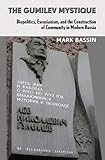The Gumilev mystique : biopolitics, Eurasianism, and the construction of community in modern Russia / Mark Bassin.
Material type: TextSeries: Culture and society after socialismPublisher: Ithaca : Cornell University Press, 2016Description: 1 online resourceContent type:
TextSeries: Culture and society after socialismPublisher: Ithaca : Cornell University Press, 2016Description: 1 online resourceContent type: - text
- computer
- online resource
- 9781501703393
- 1501703390
- Gumilev, L. N. (Lev Nikolaevich), 1912-1992
- Gumilev, L. N. (Lev Nikolaevich), 1912-1992
- Gumilev, L. N. (Lev Nikolaevich), 1912-1992
- Gumil�ev, Lev Nikolaevi�c 1912-1992
- Sovetskaja Associacija Me�zdunarodnogo Prava
- Ethnology -- Soviet Union -- History
- Soviet Union -- Historiography
- Eurasian school
- Soviet Union -- Intellectual life
- SOCIAL SCIENCE -- Discrimination & Race Relations
- SOCIAL SCIENCE -- Minority Studies
- POLITICAL SCIENCE -- Political Ideologies -- Nationalism & Patriotism
- Ethnology
- Eurasian school
- Historiography
- Intellectual life
- Soviet Union
- Eurasismus
- Eurasische Bewegung
- 305.80092 23
- DK38.7.G86 B37 2016eb
Includes bibliographical references and index.
The nature of ethnicity -- Ethnogenesis, passionarnost� and the biosphere -- Varieties of ethnic interaction -- The ethnogenetic drama of Russian history -- Soviet visions of society and nature -- Ethnicity as ideology and politics -- Gumilev and the Russian nationalists -- Neo-Eurasianism and the Russian question -- The ubiquity of ethnicity -- The patron of the Turkic peoples -- Conclusion : the political significance of Gumilev.
Print version record.
Since the collapse of the Soviet Union, the legacy of the historian, ethnographer, and geographer Lev Nikolaevich Gumilev (1912 1992) has attracted extraordinary interest in Russia and beyond. The son of two of modern Russia's greatest poets, Nikolai Gumilev and Anna Akhmatova, Gumilev spent thirteen years in Stalinist prison camps, and after his release in 1956 remained officially outcast and professionally shunned. Out of the tumult of perestroika, however, his writings began to attract attention and he himself became a well-known and popular figure. Despite his highly controversial (and often contradictory) views about the meaning of Russian history, the nature of ethnicity, and the dynamics of interethnic relations, Gumilev now enjoys a degree of admiration and adulation matched by few if any other public intellectual figures in the former Soviet Union.
In English.
eBooks on EBSCOhost EBSCO eBook Subscription Academic Collection - Worldwide

